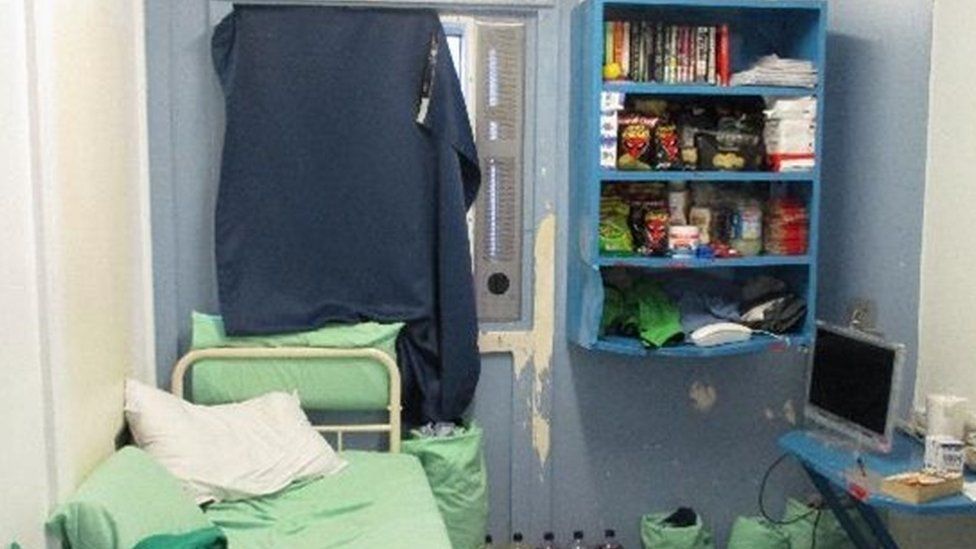
Wetherby Young Offender Institution holds some of the most complex and vulnerable young prisoners, inspectors say.
A vulnerable girl in a young offenders institution twice had her clothes removed under restraint by an all-male team of prison officers, a report says.
The inmate had been stripped to stop her using her clothes to harm herself at Wetherby Young Offender Institution.
The incident emerged in a report critical of the facility, which houses some of the UK’s most complex children.
It found care for vulnerable young people – especially girls – was “not good enough”.
Charlie Taylor, HM Chief Inspector of Prisons, said there was “no effective model of custody” for the facility’s small female population.
There are seven girls imprisoned in England and Wales. When Wetherby was inspected last December, three were held there – a small fraction of the institution’s 165 inmates.
Wetherby saw almost 900 incidents of self-harm in the space of a year – the highest of any prison in England and Wales – and more than half were accounted for by the three girls.
Some child inmates had very little time out of their cell, particularly at weekends, the report said
The report found the “extremely high” levels of self-harm had led to “very high” levels of use of force and assaults on staff.
It singled out the treatment of one particular girl who was using her clothes to make ligatures.
Mr Taylor said: “We were deeply shocked to find adult male officers restraining and stripping an incredibly vulnerable girl not once but twice.
“While they no doubt acted to prevent serious harm, the presence of multiple men pinning her down and removing her clothes will have caused further trauma and, given how predictable the behaviour of this particular girl was, the [young offender institution] has no excuse not to have made sure that female officers were in attendance.”
- If you have been affected by any of the issues raised in this story you can visit BBC Action Line.
The report found there is not a “coherent plan” to deal with the prison system’s small population of girls more widely.
It said children held there spent too much time locked in their cells, received a poor standard of teaching and were subjected to a high rate of “pain-inducing restraint techniques”.
Twenty four children were strip-searched over 12 months – half of which were carried out forcibly – and many of those incidents were not properly authorised or reviewed.
Mr Taylor credited the governor with making Wetherby more stable in recent years but concluded its safety score had to be downgraded, particularly because of its care for girls.
It described the insistence from leaders at Wetherby that they lack sufficient frontline managers to make progress on some key issues as “scarcely credible” given it had 91 members of staff in senior positions.
Image source, HMI Prisons
Some young inmates at Wetherby are allowed to use a sensory room
Inmates at Wetherby are between 15 and 18 and almost half have been in the care system during their lives. Some are beginning very long or life sentences.
The report has prompted calls for reform of youth justice in England and Wales.
Andrea Coomber, of the Howard League for Penal Reform, said: “It is virtually impossible to imagine the damage caused to the girl who, made to live in a prison designed for boys, became so distressed to the point of wanting to harm herself and was then forcibly stripped by a group of men not once but twice.
“It is appalling that the state’s care for vulnerable children could sink to such depths.”
Campbell Robb, chief executive of the charity Nacro, said: “A group of men forcibly stripping a distressed young girl, hurting and locking away children in cold cells is not how any child should be treated in a civilised society, whatever they have done in the past.
“The government must act immediately to improve the lives of these children and to lay out a comprehensive improvement plan across all of these institutions.”
A Ministry of Justice spokeswoman said custody should be the last resort for children who commit crime and the number of girls in youth custody had decreased since 2015.
“This small number of girls have exceptionally complex needs and require specialised support, which is why HMYOI Wetherby is providing additional training to staff on self-harm and increasing opportunities for meaningful activity, education and personal development,” she said.
“Restraint is only used on children in rare circumstances when there is no alternative to prevent serious harm to the child, other children or staff.”








